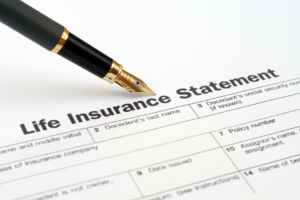[fusion_builder_container hundred_percent=”yes” overflow=”visible”][fusion_builder_row][fusion_builder_column type=”1_1″ background_position=”left top” background_color=”” border_size=”” border_color=”” border_style=”solid” spacing=”yes” background_image=”” background_repeat=”no-repeat” padding=”” margin_top=”0px” margin_bottom=”0px” class=”” id=”” animation_type=”” animation_speed=”0.3″ animation_direction=”left” hide_on_mobile=”no” center_content=”no” min_height=”none”]
Deductibles, in the insurance sense, are an amount of money that you, the insured, pay before the insurance company is obliged to pay anything toward a covered loss. A “covered loss” is one that the insurance company promised to pay in the policy.
Deductibles are found in many kinds of insurance. These include car insurance, homeowner’s insurance, health insurance, and commercial insurance policies of various kinds. Deductibles are even found in some types of malpractice insurance policies. A malpractice insurance policy protects a professional like a doctor, dentist, lawyer, or an accountant from personal liability for negligence that causes damage to others. Deductibles are not involved in life insurance policies.
How Do Deductibles Work?
As we have defined the term, a deductible is an amount of money that you have to pay before your insurance company’s responsibility to pay is triggered. Here are some examples of how insurance deductibles work:
- Suppose you have an automobile collision resulting in damage costing $700 to repair. If you have collision damage insurance coverage on your car with a $250 deductible, you are responsible for paying the repair shop $250, while the insurance company will pay $450.
- A homeowner’s insurance policy will usually have several deductibles. For example, if a tree falls onto the roof resulting in the roof’s damage or destruction, you will normally be responsible for the payment of the deductible and the insurance company will pay the rest to repair or replace the roof. Then, suppose that because of the same incident, you can’t live in the house and have to go elsewhere during repairs. During that time, jewelry insured under the homeowner’s policy gets stolen. There will usually be a separate deductible for the jewelry.
- Imagine that you have health insurance and are hospitalized for an illness or an injury. Health insurance policies also have deductibles. They are a part of what has come to be called “cost-sharing.” The other big part of cost-sharing is co-payments, but they work differently. A health insurance deductible works much like the other examples in that until the deductible is met, the insurance company is not obligated to pay anything. With health insurance, deductibles are usually measured in terms of covered health care expenses incurred annually.
- Deductibles occur in various kinds of commercial insurance. For example, a commercial insurance policy may insure a building against fire loss or water intrusion. In that case, the deductible works in about the same way as the tree falling on someone’s house.
- Professional liability insurance policies (sometimes called “malpractice insurance”) can have deductibles. However, the term used might be “self-insured retention”. It means that the insured agreed to absorb some of the cost of defending himself/herself from a claim and/or paying damages that would otherwise be paid by the insurance company.
What Do Insurance Deductibles Do?
One of the main purposes of insurance deductibles is to shift the monetary risk of loss to, the insured. The higher the deductible, the more money that is your responsibility to pay toward the damage or expense of a covered occurrence. That doesn’t mean that the kinds of things that the insurance policy covers changes. It just means that when something happens that is covered, you have to pay for more of the expenses associated with it.
The big corollary to a higher deductible is a lower premium. A premium is the amount of money paid to an insurance4 company for the protection of an insurance policy. The reason is pretty simple: because the responsibility of the insurance company to pay anything isn’t triggered until you pay a greater amount toward the damage. That is, you have to pay up to the deductible amount, so the higher that it is, the less risk is on the insurance company and the less it charges you for premium.
How to Pick the Right Deductible
Picking the right deductible requires you to think about several factors-some of them are related and some are not.
- What is the subject of the insurance? If you have collision coverage on an older, high-mileage domestic car, the cost of repairing collision damage is likely to much less than the cost of repairing damage to a much newer import. Therefore, you may choose to get a higher collision deductible on the older car. Also, even if it gets damaged but is still drivable, you may just not care. In the long run, you will have saved money by paying a lower premium for the higher deductible.
- Determine whether you have enough money on hand to pay deductibles Homes that are severely damaged by fire or otherwise may need to be essentially rebuilt. If your car was in the garage when the fire occurred, there may be 2 deductibles to pay.
- Some banks or mortgage companies require that your homeowner’s deductible be under a stated amount. That’s because it wants to ensure that there will be enough money to get the house repaired and thereby, protect its investment (the mortgage based on the value of the house).
- While it is probably unrealistic to think that you can predict future health, look backwards at you history of illness, accidents, and hospitalizations. Look at the activities in which you engage, your drinking, smoking, medications, genetic predispositions to diseases, and other factors that could have a bearing on your health. That could help decide upon an appropriate deductible for your health insurance. If you have been historically healthy, you may want to risk that you will stay that way, go for a higher deductible, and pocket the difference in premium. If your situation is otherwise, it may be a better idea to get a lower deductible rather than to risk high, non-covered health expenses.
[/fusion_builder_column][/fusion_builder_row][/fusion_builder_container]

